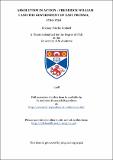Files in this item
Absolutism in action : Frederick William I and the government of East Prussia, 1709-1730
Item metadata
| dc.contributor.advisor | Scott, Hamish M. | |
| dc.contributor.author | Gothelf, Rodney Mische | |
| dc.coverage.spatial | xiv, 420 p. | en_US |
| dc.date.accessioned | 2018-06-20T14:55:19Z | |
| dc.date.available | 2018-06-20T14:55:19Z | |
| dc.date.issued | 1998-05 | |
| dc.identifier.uri | https://hdl.handle.net/10023/14358 | |
| dc.description.abstract | This dissertation examines the operation of Hohenzollern government in the distant but crucial territory of East Prussia during the reign of Frederick William I, 1713-40 to determine what impact the establishment of the General Directory in late 1722 and early 1723 had upon day-to-day administration within the Kingdom of East Prussia. Particular attention is given to the role and operation of provincial and local government in East Prussia during the decades before and after the setting up of the General Directory (General-Ober-Finanz-Kriegs-und Domänen-Direktorium). This study is part of a broader historiographical tendency which questions both the extent and success of Hohenzollern state building and calls into question the validity of the traditional view which gives most attention to the positive role of central state structures and considers the establishment of the General Directory as the apex of the much-admired and widely-emulated Prussian administrative system. This study demonstrates that further governmental modifications were needed in the Kingdom before and after the General Directory's successful operation in the Kingdom in the 1720s and 1730s. The territorial and local levels were where the Hohenzollern rulers would find it crucial to establish their absolutist power. One difficulty Frederick William I faced was that a large corps of loyal officials was lacking in the Kingdom which was only partially remedied by the end of his reign. In addition, critical administrative disputes continued and new ones arose between the King's administrative agencies. Moreover, the powerful native elites who lived in the Kingdom retained significant authority at the provincial and local levels and resisted many reform attempts by a king who they saw as foreign. Their enduring importance helps to explain the distinctive manner in which absolutism developed over these decades. As a result, authority in the Kingdom still was less than securely established by the final decade of Frederick William I's reign. | en_US |
| dc.language.iso | en | en_US |
| dc.publisher | University of St Andrews | |
| dc.subject.lcc | DD491.O61G7 | en |
| dc.subject.lcsh | Prussia (Kingdom). Sovereign (1713-1740 : Frederick William I) | en |
| dc.title | Absolutism in action : Frederick William I and the government of East Prussia, 1709-1730 | en_US |
| dc.type | Thesis | en_US |
| dc.accrualMethod | Prussia (Germany)--Politics and government | en |
| dc.contributor.sponsor | Russell Trust | en_US |
| dc.contributor.sponsor | German Historical Institute in London | en_US |
| dc.type.qualificationlevel | Doctoral | en_US |
| dc.type.qualificationname | PhD Doctor of Philosophy | en_US |
| dc.publisher.institution | The University of St Andrews | en_US |
This item appears in the following Collection(s)
Items in the St Andrews Research Repository are protected by copyright, with all rights reserved, unless otherwise indicated.

